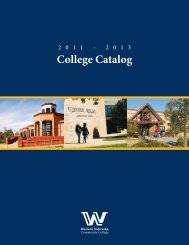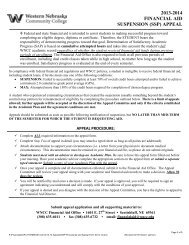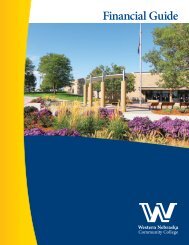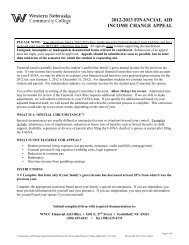WNCC 2010 Self-Study Report - Western Nebraska Community ...
WNCC 2010 Self-Study Report - Western Nebraska Community ...
WNCC 2010 Self-Study Report - Western Nebraska Community ...
You also want an ePaper? Increase the reach of your titles
YUMPU automatically turns print PDFs into web optimized ePapers that Google loves.
As can be seen, <strong>WNCC</strong> fared well in several categories compared to other small colleges and<br />
cohort intuitions. Even though student participation in student organizations seems low, the<br />
comparative satisfaction rating was high. Transfer credit assistance also received favorable<br />
ratings. The fact that academic advising/planning indicated the highest satisfaction at 76.5% is<br />
intriguing when linked with other findings. Students ranked academic advising/planning as “Very<br />
Important” or “Somewhat Important” (90.1%), and they self-reported as participating in academic<br />
advising/planning either “Sometimes” or “Often” for a total of about 55.0% of the time. The<br />
“Sometimes” result was 42.9%; the “Often” result was only 12.1%.<br />
Students seem to be satisfied with the academic advising they receive, but the number of students<br />
engaged in such advising appears to be lower than would seem to be necessary in order to sustain<br />
a link between an advisor (faculty member of otherwise) and the institution.<br />
Since research indicates that a student-faculty member connection is a critical component of<br />
retention strategies (as previously discussed), the results from the 2007 CCSSE report about the<br />
frequency of advising consultations served as one of the precipitating factors in the decision to<br />
bring the central advising in closer proximity to academic advising--when the Student Services<br />
personnel from the Williams Building were relocated to the main building at Scottsbluff. Students in<br />
Sidney and Alliance primarily work with a Student Services representative for advising, except for a<br />
few in specialized areas like nursing, where they consult with a faculty member in the discipline to<br />
ensure that they remain in step with the program.<br />
The “Services to Students with Disabilities” category appears from this initial survey report to be a<br />
matter of institutional concern. The new ADA guidelines and comprehensive strategy named the<br />
Compensatory Abilities Policy addressed the issue somewhat, but there may remain a problem in<br />
the routing of concerns to the Disability Services Officer, the time available for him to spend with<br />
individual students, or in the lack of formal communications or meetings wherein faculty members<br />
can understand best methods of implementation for prescribed accommodations.<br />
Of course, the term disability can mean anything from physical impairment to a diagnosable<br />
learning disability of some type, so the range of possibility in the question makes it hard to<br />
understand which specific area needs the most attention in the time between first encounter and<br />
fully implemented service. Given that returning veterans and more students from the K-12 ranks<br />
will be entering higher education and more of them may require specific support of some type in<br />
order to succeed, it is important to <strong>WNCC</strong> to refine strategies to assist the students. An important<br />
step will be to compare the results from the same question on the 2009 report when it is reviewed.<br />
Summary<br />
The College has a long tradition of service in its district, particularly in Scottsbluff as a junior<br />
college and then later as it expanded farther into the service area with branch campuses and<br />
additional academic and industry-related training. Although the other campuses have been in their<br />
respective communities for shorter periods of time, they also have become vital but customary<br />
additions because the <strong>WNCC</strong> listens to its constituents and responds to their needs. The citizens<br />
who live and work in the area nearly universally support and take pride in their local highereducation<br />
institution, a fact which is invariably noted by visitors or job candidates who inquire about<br />
the College in one of the host communities where a campus is located.<br />
<strong>Western</strong> <strong>Nebraska</strong> <strong>Community</strong> College Page 173









